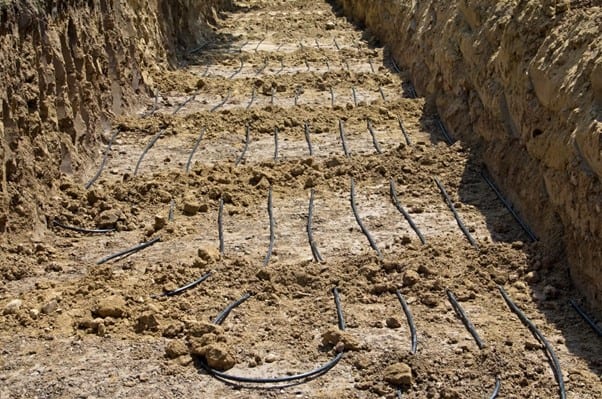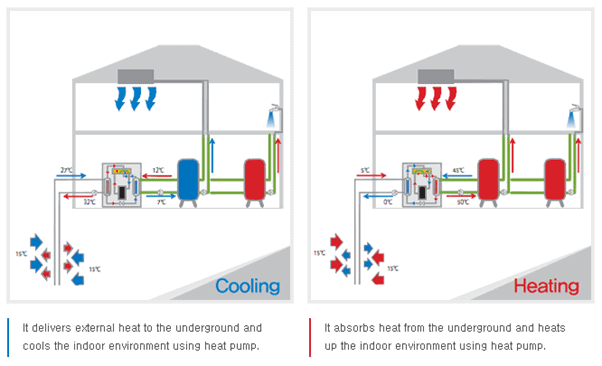
The top 8-10 feet of earth around your home (hotter part of the world/geothermal active regions) remain at around 55 to 60 degrees all year round. A typical system consists of a small heat pump or heat exchange unit, a closed loop system of piping, an antifreeze solution, and refrigerant.
Heat is drawn out of your house to pass through the antifreeze in the piping and is released into the ground. The warmth in your home is absorbed by the refrigerant, leaving cool air in its wake. It’s called a loop because this process repeats until the ambient temperature reaches your setting.
This type of home air conditioner works with your existing duct system to heat or cool your home. It can be used in homes with little acreage, in which the loops will be vertical, going straight down into the ground. Homes on larger lots can use a horizontal loop system.
If there’s water nearby, such as a pond or lake, a loop system can use the water to conduct the heat out of the house and return cool air. This is referred to as an open-loop.

Conventional air-to-air HVAC systems lose efficiency when the temperature outside begins to fluctuate. However, geothermal energy comes from the Earth itself, which maximizes the transfer of heat. The temperature of the earth remains stable throughout the year, so the efficiency of the unit is unsurpassed.
Geothermal heating and cooling equipment incorporate three essential elements responsible for the remarkable efficiencies:
- The Conduit: The conduit serves as the pathway between the condenser and the earth. It’s the mechanism that accommodates the transfer of heat from the ground to your home in the winter and from your home to the earth in the summer.
- The Condenser: The condenser includes the condensing coil, compressor and a number of other components that facilitate the refrigeration cycle.
- Air Distribution Network: A geothermal heat pump can be adapted to work with virtually every existing air distribution method.
Health Benefits of Geothermal Systems
Forced air central air condition systems distribute air throughout your house via ducts at set temperatures. The air passes through filters to catch allergens and impurities in the air such as biological contaminants, pet dander, or micro-organisms like bacteria. What isn’t caught in the filters can irritate household members who have asthma, allergies, or other lung problems.
Geothermal HVAC air conditioning systems use forced air like traditional HVAC systems, but fewer contaminants affect your home’s indoor air quality. Residents with breathing problems won’t be irritated as much and will breathe much easier.
Life Expectancy and Maintenance
Geothermal heating and cooling systems have fewer mechanical parts. They won’t wear out like conventional HVAC systems would. They require little maintenance over their lifetimes.
Geothermal systems can last up to 50 years as opposed to the 12- to 15-year lifespan of their HVAC system cousins. Their warranty options are more attractive than those of HVAC units. With a geothermal unit, you won’t have to worry about carbon monoxide problems and fire hazards.
Financial Benefits of Geothermal Systems
Fewer mechanical parts mean the system is unlikely to break down or wear out, so maintenance costs will be much less for geothermal heating and air conditioning. Only a tiny bit of electricity is used to operate the heat pump beside the tubing underground, so less is being added to your power bill. Those are the two main financial drains regarding AC systems, so the savings are attractive to homeowners.
Energy Efficiency
Geothermal heating and air conditioning systems reduce peak-time electricity use. They also decrease emissions. Their efficiency reduces our carbon footprint considerably.
This is a renewable source of energy, which means less usage of the electricity grid. The geothermal system’s heat pump lessens electricity usage by up to 70%, making the unit 400% more energy efficient.
For more info: New Zealand Geothermal Association https://nzgeothermal.org.nz/

www.apexair.co.nz

